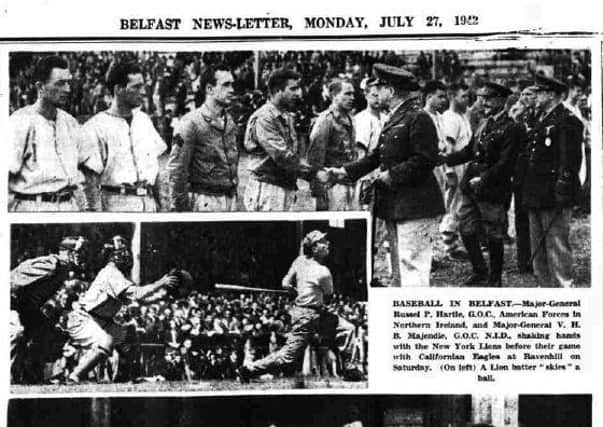THROUGH THE ARCHIVES: Baseball thrill as the Eagles beat the Lions at Ravenhill Grounds


The Governor of Northern Ireland and the Duchess of Abercorn had been guests at the Ravenhill Grounds in Belfast for the second big baseball match, reported the News Letter on this day in 1942.
An enthusiastic crowd of some thousands saw the Californian Eagles beat the New York Lions nine runs to six, by grand hitting off the Lions’ first and second pitchers, Lieutenant H W Martin and Sergeant R H Hensley.
Advertisement
Advertisement
A Lions’ batter, however, provided the thrill of the afternoon. Krulach. one of their ace bats, hit a home run, to the farthest corner of the field, and while the fielders all dashed into position to relay the ball in a series of volleying throws back to the basemen Krulach went round the bases “like a whirlwind”, and a man on second base also ran home to credit the hit with two runs.
Spectators at the game then got an idea of how an American crowds can roar. “There was a considerable company of American troops in the stand and ground, and their roars of glee, mingled with the high-pitched calls of the opposition, and the shouts and thunderous clapping of the Ulster spectators turned Ravenhill for a minute or into a Yankee stadium,” noted the News Letter’s correspondent who was at the game.
They continued: “How these American boys got keyed! From mere baseball the match suddenly became the ‘ballgame’ in earnest.”
That pushed up the Lions’ score from 4 to 6-3, but shortly afterwards their third man was got out by one of those lightning catches with the right (gloved) hand of a baseman, and the Eagles proceeded to rise to the occasion.
Advertisement
Advertisement
In the seventh and eighth innings they put on no fewer than six runs, with men on the second and third base getting home on a fine hit, nicely placed between the distant fielders by L J Robinson.
The Lions’ catching and fielding got a bit ragged here, as the Eagles had two men home from the third base when the Lions’ catcher, most uncharacteristically, let two pitched balls slip past him. While he retrieved them, men on the third base, who had been sneaking a few yards towards ‘home’, did a lightning dash and rocketed into the home ‘plate’ before the catcher could get the ball back to the pitcher, who also streaked the 20 yards into the home base to take the ball and try to touch his man ‘out’.
The News Letter’s correspondent commented: “The crowd, soon initiated into this ‘sneaking home play’ by the sly comments of the loudspeaker commentator, were on their toes for it and laughed and shouted their appreciation. By the time three or four innings were over, even the completely uninitiated knew from the commentator sufficient about the game to enjoy it.”
The News Letter’s correspondent added: “Two things impressed Ulster sportsmen, watching this second big baseball match in Belfast. Those were the slick stopping and catching of the ball by those fielding, and the apparent miracle of batters being able to connect squarely with the ball and bang it astonishing distances. Catches are not always easy. Sometimes the ball rockets and curves in the air off round wooden ‘club’, but the fielders given any chance at all can snap a glove over it.
Advertisement
Advertisement
“The crowd, entertained between innings by the lively playing of American Army bands, went away looking forward to the next game.”
The proceeds from the game were for the Belfast Hospital for Sick Children and the Ulster Hospital for Children and Women, and Major-General Hartle, GOC, the US Forces in Northern Ireland, who inspected the teams before the game, said that he could assure all present of the pleasure which it afforded the Americans to contribute to a very worthy charity - the hospitals.
He said that it “was but a small way to return the many kindnesses received by them both from the citizens and the British troops in Northern Ireland.”